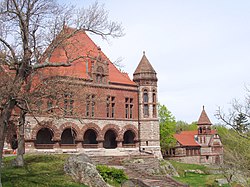H. H. Richardson Historic District of North Easton
|
H. H. Richardson Historic District of North Easton
|
|

Oakes Ames Memorial Hall and Ames Free Library, two of the five buildings in the landmark district
|
|
| Location | Main St., Elm St., & railway right-of-way off Oliver St., Easton, Massachusetts |
|---|---|
| Coordinates | 42°4′12″N 71°6′2″W / 42.07000°N 71.10056°WCoordinates: 42°4′12″N 71°6′2″W / 42.07000°N 71.10056°W |
| Area | 5.8 acres (23,000 m2) |
| Architect | H. H. Richardson; Frederick Law Olmsted |
| NRHP Reference # | 87002598 |
| Significant dates | |
| Added to NRHP | December 23, 1987 |
| Designated NHLD | 23 December 1987 |
The H. H. Richardson Historic District of North Easton is a National Historic Landmark District in the village of North Easton in Easton, Massachusetts. It consists of five buildings designed by noted 19th-century architect Henry Hobson Richardson, and The Rockery, a war memorial designed by Frederick Law Olmsted. It was declared a National Historic Landmark in 1987.
The landmark district is contained within the larger North Easton Historic District which was added to the National Register of Historic Places on November 3, 1972. It also contains the Old Colony Railroad Station which was individually listed on the NRHP on April 11, 1972.
Easton was first settled in 1694 and was officially incorporated in 1725. In 1694, the first settler, Clement Briggs established his home near the Easton Green. In 1711, the Taunton North Purchase area became Norton, and in 1713, the twenty-six families settled in Easton and hired Elder William Pratt as their first minister. There was no legal parish in Easton until 1722 when the East Precinct of Norton was recognized. In 1725, the area was incorporated as the Town of Easton; it was so named because it was formerly called the "East End" of the Taunton North Purchase and was shortened by pronunciation to Easton.
In 1803, the Ames Shovel Company was established and became nationally known as having provided the shovels which laid the Union Pacific Railroad and opened the west. In 1875, the shovel production of the Ames plant was worth 1.5 million. The most notable of the Ames family were Oakes Ames, a key figure in the Crédit Mobilier of America scandal, and Oliver Ames, governor of Massachusetts from 1887–1890.
...
Wikipedia


